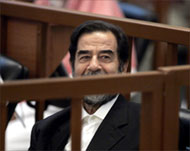Report links Saddam to executions
The prosecution in the trial of Saddam Hussein presented a new report by handwriting experts that linked the deposed Iraqi leader to the execution of Shia villagers in the 1980s.

After a 90-minute session with Saddam and his seven co-defendants in court on Monday, the trial was adjourned until May 15, when the defence is expected to start presenting witnesses.
The tribunal was presented with a new report from handwriting experts that confirmed Saddam’s signature was on documents linking him to the execution of 148 Shia who made an attempt on his life as he was in their village of al-Dujail in 1982.
The latest report showed that the signatures of all defendants were “matching” except for that of Mizhar Abdallah Ruweid, a former Baath party official in the al-Dujail area.
Saddam and his seven co-accused pleaded not guilty to charges including murder and torture over the al-Dujail incident when the trial opened in October. If found guilty, they face the death penalty.
Farms destroyed
On Monday, the prosecution also played a recording of a conversation between Saddam and his former vice-president, Taha Yassin Ramadan, in which the two men reportedly discussed the retaliatory destruction of farms and orchards belonging to al-Dujail villagers.
Saddam’s half-brother and former secret police chief Barzan Ibrahim al-Hassan al-Tikriti dismissed the latest handwriting findings.
 |
|
Saddam remained silent |
“Even if you bring 50 handwriting experts, they all will say the same thing,” said Barzan, who repeatedly denounced the prosecution and the court during the trial.
“We know that the decision against us has already been taken as this court is politically driven.”
In the previous hearing on April 19, chief judge Rauf Abdel Rahman ruled after seeing a report by handwriting experts that signatures linking Saddam to the massacre of the Shias were authentic.
“The experts verified these documents, and the signatures of Saddam Hussein were found to be authentic,” Abdel Rahman said.
Dismissing evidence
Saddam has dismissed the evidence, insisting the documents were forged, and saying the witnesses testifying against him have been bribed by the prosecution.
In earlier hearings, Saddam acknowledged he had ordered the trial of al-Dujail villagers suspected of plotting to assassinate him, but stopped short of admitting he was responsible for their executions.
His lawyers have contested the earlier handwriting report, demanding that a neutral body make a judgment on the authenticity of the signatures.
The documents presented by the prosecution came from the Revolutionary Command Council, the former government’s highest decision-making body.
Documents
The prosecution has presented volumes of documents linking the former president and others to the killings, including signed letters ordering the villagers to be tried and jailed and later allegedly executed.
The trial has been marred by the murder of two defence lawyers and the January resignation of the first chief judge, who critics say failed to check Saddam’s outbursts.
International human rights experts say that the trial continues to be conducted below international legal standards.
After the Dujail trial, Saddam and his seven co-defendants will face charges of genocide over the 1988 Anfal campaign against the Kurds that left 100,000 to 180,000 people dead.